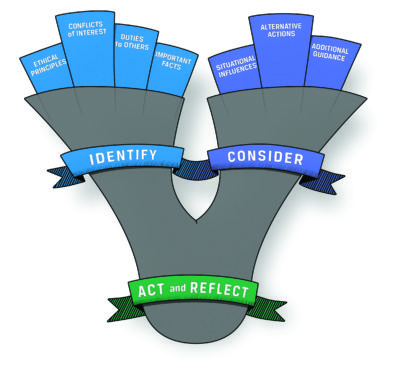Ethics in Practice: Oh No! Accidental Facebook Post! Case for Week of 15 January
Analysis now posted. How did you do?
Are you keeping up with your New Year’s resolution to build your ethical decision-making skills? Read on for this week’s case, and then let us know what you believe is the right choice.
Case
John Walsh, CFA, is the Chief Financial Officer of TrueTech Corporation, a leading semiconductor manufacturer in the United States. For the past few months, Walsh has led the TrueTech team in talks to buy a majority stake in Veridy Corporation, a smaller, privately owned semiconductor company that has a patented technology that could potentially cut the chip manufacturing costs of TrueTech by almost 40%. After intense negotiations, TrueTech is able to close the deal with Veridy late on a Friday night. Walsh wants to share the good news with his wife, so he takes out his phone and types “Finally! TrueTech has acquired a majority stake in Veridy. The deal is sealed!” But instead of sending the message to his wife, he accidentally posts it on his personal Facebook page. The next morning (a Saturday), he wakes up and discovers the blunder. Did Walsh violate any part of the CFA Institute Code of Ethics or Standards of Professional Conduct?
- No, this was an honest mistake.
- Yes, but Walsh does not need to do anything to rectify the matter because the posting was unintentional.
- Yes, Walsh should immediately disclose his actions to TrueTech and Veridy.
- Yes, Walsh should post the merger information on the company website and make a public announcement about the transaction.
Analysis
This case is involves Standard IV(A): Duties to Employers – Loyalty, which states that CFA Institute members must not “divulge confidential information or otherwise cause harm to their employer.” Even though his action was unintentional, Walsh violated his duty of loyalty to his employer because he disclosed confidential information about TrueTech outside the company. The honest mistake does not exonerate him from violation. Walsh is also in danger of violating Standard II(A): Material Nonpublic Information, which states that CFA Institute members must “not act or cause others to act” on material nonpublic information. Walsh inadvertently leaked material nonpublic information to the select group of people who are his friends on Facebook. But there is no indication from the facts given that any of Walsh’s Facebook friends who received the merger information tried to take advantage of that information. Walsh should take steps to attempt to rectify his mistake. Although Walsh should notify TrueTech and Veridy of his error, that does not go far enough. The most appropriate course of action is for Walsh to publicly disseminate the news of the merger as quickly as possible so that the information is available to all investors. Answer D is the best choice.
This case was written by Tanuj Khosla, CFA, CAIA, and the facts are not based on any particular case.
Have an idea for a case for us to feature? Send it to us at [email protected].
New release of the CFA Institute Member App now available. See below for more information.
More About the Ethics in Practice Series
Just as you need to practice to become proficient at playing a musical instrument, public speaking, or playing a sport, practicing assessing and analyzing situations and making ethical decisions develops your ethical decision-making skills. To promote “ethical exercise,” we are excited to introduce Ethics in Practice.
Each week, we post a short vignette, drawn from real-world circumstances, regulatory cases, and CFA Institute Professional Conduct investigations, along with possible responses/actions. We then encourage you to assess the case through the lens of the Ethical Decision-Making Framework and the CFA Institute Code of Ethics and Standards of Professional Conduct and let us know which of the choices you believe is the right thing to do and why. If you are not a CFA Institute member, you can post your choice and reasoning in the comments section below. For CFA Institute members, we would like you to join the conversation in our new Member App and post your responses there. Later in the week, we will post an analysis of the case and you can see how your response compares.
CFA Institute Member App
The Member App gives CFA Institute members access to a content from multiple CFA Institute publications, including these weekly Ethics in Practice posts. Best of all, the app allows in-app submission of Continuing Education credits, which members can earn by reading and participating in the conversation for each case. (0.25 CE, 0.25 SER). The app is available in the Apple and Google Play stores. After downloading, simply log in using your CFA Institute website credentials (e.g., [email protected] + password).
If you have already downloaded the app, be sure to get the latest update that includes new functionality:
- 2018 CFA Program Refresher Readings collection
- Ability to comment/converse around Events
- Ability to start free-standing conversations (“Forums”)
- Year-to-Date CE credit history and ability to add credits for non-CFA Institute activities using a mobile form
If you liked this post, consider subscribing to Market Integrity Insights.
Image Credit: ©CFA Institute

